-
 This is a great original set, of the famed Handel tuners from the early 20th century. Silver wire and pearl inset. In good condition. One button has a slight chip. Good working order. Price: $495.
This is a great original set, of the famed Handel tuners from the early 20th century. Silver wire and pearl inset. In good condition. One button has a slight chip. Good working order. Price: $495. -
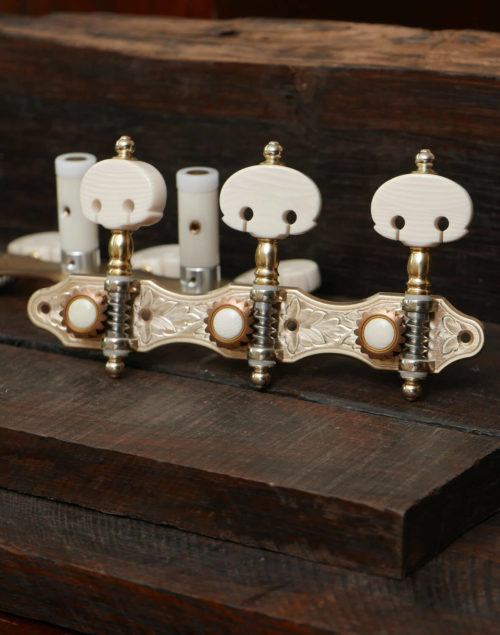 Alessi, Hauser style machine head tuners. More rare, deep silver plating. Hand made in Italy. Engraved with high detail. These are new, old stock. Made circa 2009, they have never been used or mounted on a guitar, and they come with the original mounting screws, and in their original wood presentation case. Synthetic ivory kidney shaped buttons (rare style). 35mm on center. Perfect, unused condition. Price: $895.
Alessi, Hauser style machine head tuners. More rare, deep silver plating. Hand made in Italy. Engraved with high detail. These are new, old stock. Made circa 2009, they have never been used or mounted on a guitar, and they come with the original mounting screws, and in their original wood presentation case. Synthetic ivory kidney shaped buttons (rare style). 35mm on center. Perfect, unused condition. Price: $895. -
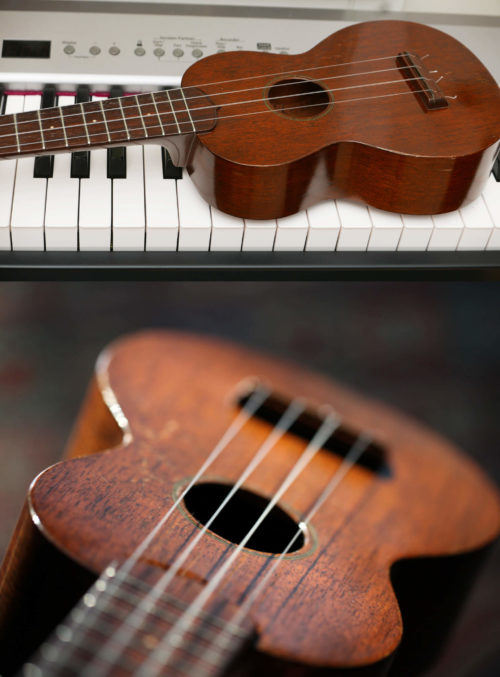 This is great example of Martin’s post war, 1950’s style 0 Ukulele. It has a few nicks and dings, but it’s 100% crack free. And it’s in its original case. It was made between 1957 and 1960 (as indicated by the tuners, and the lack of the “Made in U.S.A.”). Price: $995.
This is great example of Martin’s post war, 1950’s style 0 Ukulele. It has a few nicks and dings, but it’s 100% crack free. And it’s in its original case. It was made between 1957 and 1960 (as indicated by the tuners, and the lack of the “Made in U.S.A.”). Price: $995. -
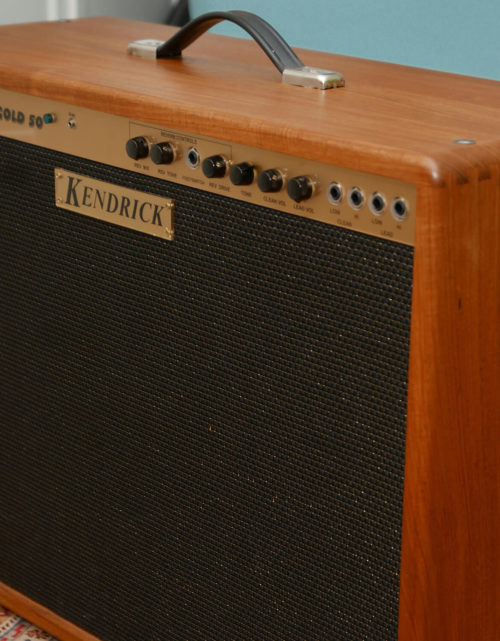 This was one of the best amps ever made by the legendary Gerald Weber. All-tube circuitry, designed and made in the USA, by Weber. It not only has power to spare (50 watts), but its unique circuitry has two channels, clean and lead, with different preamp circuit. These channels can be blended through patching the second input of one channel into the first input of the other, for purposes of blending the two channels together and further tone shaping with the interactive tone circuit. The bottom line: Tons of power if you need it, but the ability to get all the creamy, lush lead tones with the lead channel and/or blending. You just have to hear it. Original, handmade hardwood cabinet. 2 x 12: one 12 inch Kendrick brown frame and one 12 inch Kendrick black frame speaker. Kendrick's double spring reverb with three controls. Great condition. Recently serviced by one of the best amp techs in Texas. Price: $1495. No shipping. Local pickup only in Austin.
This was one of the best amps ever made by the legendary Gerald Weber. All-tube circuitry, designed and made in the USA, by Weber. It not only has power to spare (50 watts), but its unique circuitry has two channels, clean and lead, with different preamp circuit. These channels can be blended through patching the second input of one channel into the first input of the other, for purposes of blending the two channels together and further tone shaping with the interactive tone circuit. The bottom line: Tons of power if you need it, but the ability to get all the creamy, lush lead tones with the lead channel and/or blending. You just have to hear it. Original, handmade hardwood cabinet. 2 x 12: one 12 inch Kendrick brown frame and one 12 inch Kendrick black frame speaker. Kendrick's double spring reverb with three controls. Great condition. Recently serviced by one of the best amp techs in Texas. Price: $1495. No shipping. Local pickup only in Austin. -
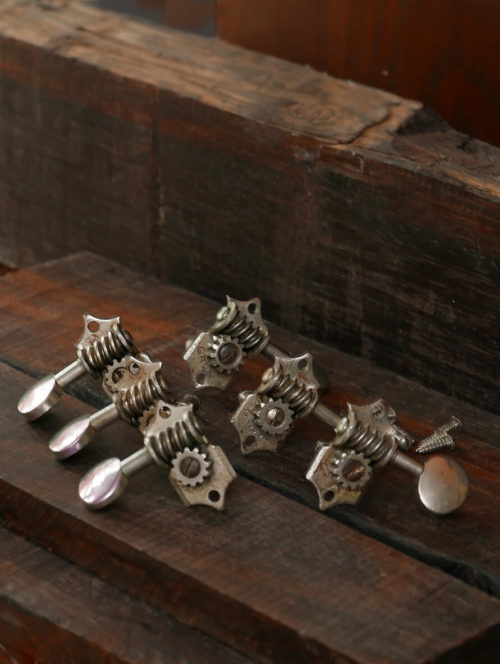 6:1 ratio pre war Grovers, mid-1930's. As used on Martin pre-war dreadoaught guitars. Oval buttons, bevelled edges on the baseplate. Just one button has some missing chrome on one side (see photos). With bushings, and mounting screws. No bent shafts. Good working condition. Price: $795.
6:1 ratio pre war Grovers, mid-1930's. As used on Martin pre-war dreadoaught guitars. Oval buttons, bevelled edges on the baseplate. Just one button has some missing chrome on one side (see photos). With bushings, and mounting screws. No bent shafts. Good working condition. Price: $795. -
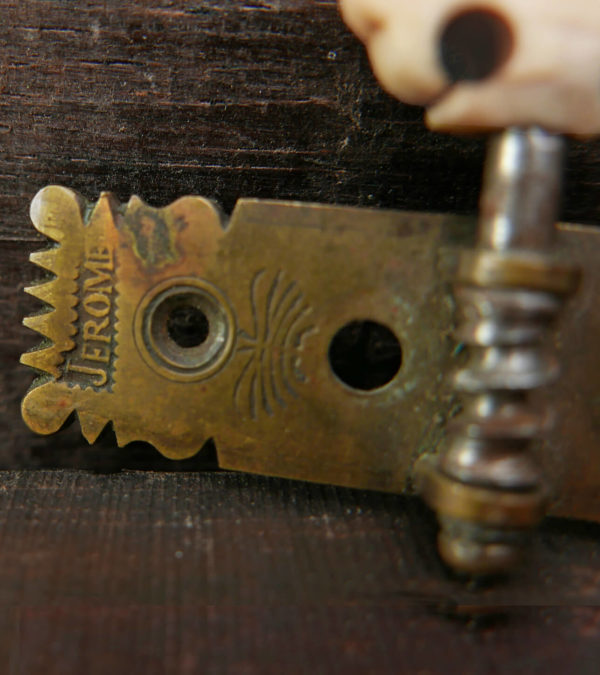 Very rare, early Jerome guitar tuners, made in France. Rare kidney buttons, as seen on higher end Martin guitars from the 1840s, 1850s, and 1860's. Plates, shafts and buttons only. No posts or worm gears (there is one post and one worm gear). Price: $595.
Very rare, early Jerome guitar tuners, made in France. Rare kidney buttons, as seen on higher end Martin guitars from the 1840s, 1850s, and 1860's. Plates, shafts and buttons only. No posts or worm gears (there is one post and one worm gear). Price: $595. -
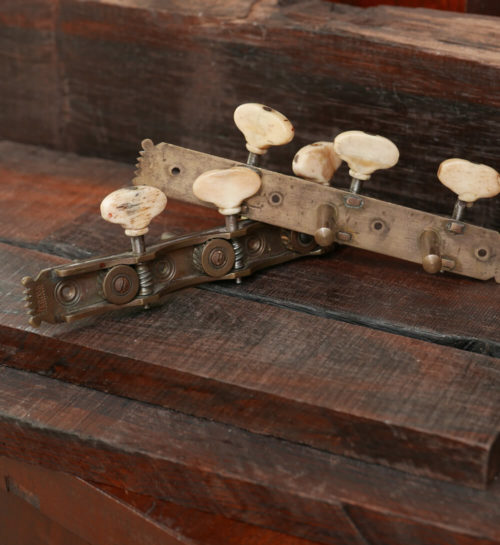 Even more rare, early Jerome’s, made in France. Circa 1840 -1850. Unusual design. Missing one post/worm gear. Damage to one worm gear bracket. Price: $795.
Even more rare, early Jerome’s, made in France. Circa 1840 -1850. Unusual design. Missing one post/worm gear. Damage to one worm gear bracket. Price: $795. -
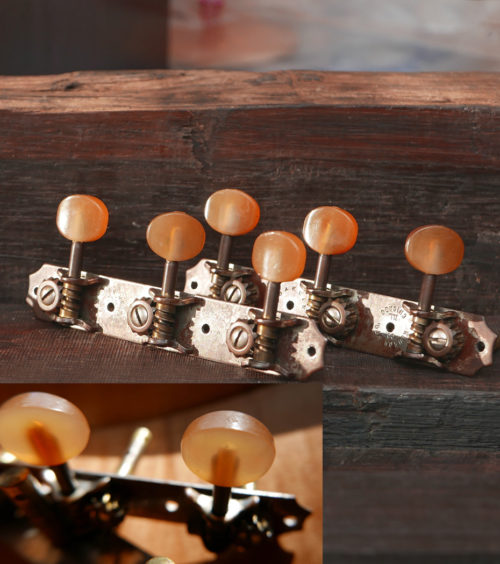 Pre-war Kluson tuners from the 1930's. Amber buttons. These are rare tuners that came on some of the nice Gibsons of the era, such as a few Gibson J35's. Good working condition. Price: $295. – on Hold
Pre-war Kluson tuners from the 1930's. Amber buttons. These are rare tuners that came on some of the nice Gibsons of the era, such as a few Gibson J35's. Good working condition. Price: $295. – on Hold -
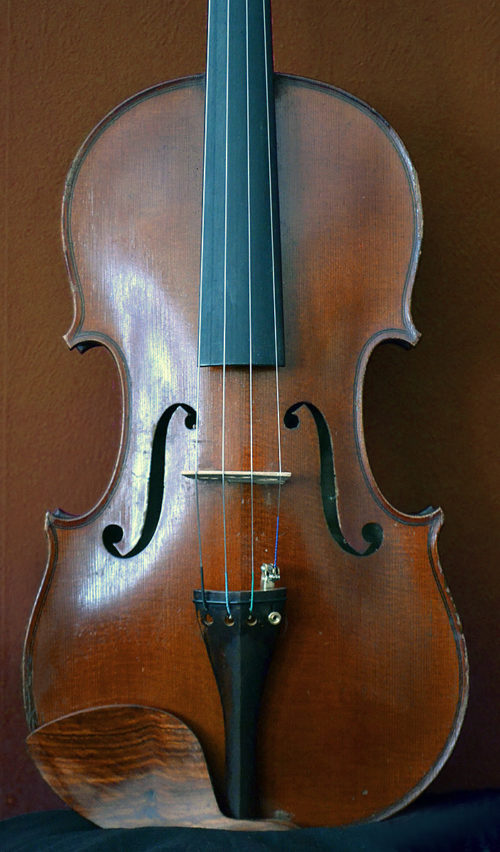 Full size, Charles Fetique violin (French, early 20th century – circa 1930), with original label inside. This is a rich, sonorous instrument. A deep, round tone, that – like all good violins – does not make you work overly hard to attain. It has a darker, lush, round tone that professional players love – and great projection. We recently A-B'd this instrument against $5k+ violins in the area, and there was no comparison, this instrument was louder, more full, more round and full in the bass notes, and all around a stellar performer. This violin would be a great student violin upgrade – for that aspiring violinist who is ready to graduate to, and enjoy, a better instrument than what's typically available in the $4-5K range, at a very attractive price. And, the buyer will have the confidence of both a Letter of Expertise, and a professional appraisal: • Certificate: Jean-Jacques Rampal, Paris, 2014. (This is the letter of expertise, on this violin, from one of the top experts on French Violins, in Paris, France). And: • Written, professional appraisal of the violin, done from personal inspection, from one of the top violin shops/experts in Texas (Jay R. Rury Violins, Dallas), with a valuation of $3,500.00 Both the above documents will be included with the sale. The violin is in excellent condition. There are no sound post, or bass bar cracks. It was professionally set up to play, by Blackerby Violin in Austin. In a modern Tonerelli case. Price: $3250.
Full size, Charles Fetique violin (French, early 20th century – circa 1930), with original label inside. This is a rich, sonorous instrument. A deep, round tone, that – like all good violins – does not make you work overly hard to attain. It has a darker, lush, round tone that professional players love – and great projection. We recently A-B'd this instrument against $5k+ violins in the area, and there was no comparison, this instrument was louder, more full, more round and full in the bass notes, and all around a stellar performer. This violin would be a great student violin upgrade – for that aspiring violinist who is ready to graduate to, and enjoy, a better instrument than what's typically available in the $4-5K range, at a very attractive price. And, the buyer will have the confidence of both a Letter of Expertise, and a professional appraisal: • Certificate: Jean-Jacques Rampal, Paris, 2014. (This is the letter of expertise, on this violin, from one of the top experts on French Violins, in Paris, France). And: • Written, professional appraisal of the violin, done from personal inspection, from one of the top violin shops/experts in Texas (Jay R. Rury Violins, Dallas), with a valuation of $3,500.00 Both the above documents will be included with the sale. The violin is in excellent condition. There are no sound post, or bass bar cracks. It was professionally set up to play, by Blackerby Violin in Austin. In a modern Tonerelli case. Price: $3250. -
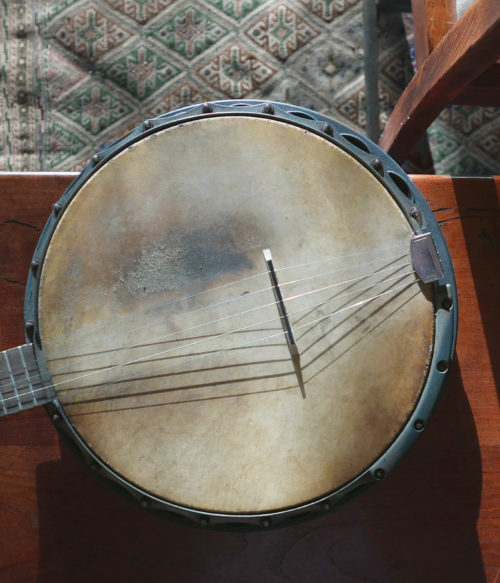 This Banjo has a unique tone, that only comes from a Gretsch Die-cast metal shell/flange construction, prewar banjo. But it’s rare to see these banjos in anything other than tenor. This one is a rare, original 5 string configuration, and has a nice “Gretsch growl” (a term that some drummers use to describe Gretsch drums). Wonderful, dark tone, with bell-like high notes. And with a bit of sustain that is reminiscent of a prewar Dobro guitar. Growl, plus sustain, and ringing highs – only from a Gretsch prewar banjo. Pearloid heastock overlay. 11 inch head. 26 inch scale length. 22-fret Brazilian rosewood fingerboard, with dot markers. Walnut neck, and resonator. Top tension head adjustment with 20 lugs. Original calf skin head. Price: $750.
This Banjo has a unique tone, that only comes from a Gretsch Die-cast metal shell/flange construction, prewar banjo. But it’s rare to see these banjos in anything other than tenor. This one is a rare, original 5 string configuration, and has a nice “Gretsch growl” (a term that some drummers use to describe Gretsch drums). Wonderful, dark tone, with bell-like high notes. And with a bit of sustain that is reminiscent of a prewar Dobro guitar. Growl, plus sustain, and ringing highs – only from a Gretsch prewar banjo. Pearloid heastock overlay. 11 inch head. 26 inch scale length. 22-fret Brazilian rosewood fingerboard, with dot markers. Walnut neck, and resonator. Top tension head adjustment with 20 lugs. Original calf skin head. Price: $750. -
Out of stock
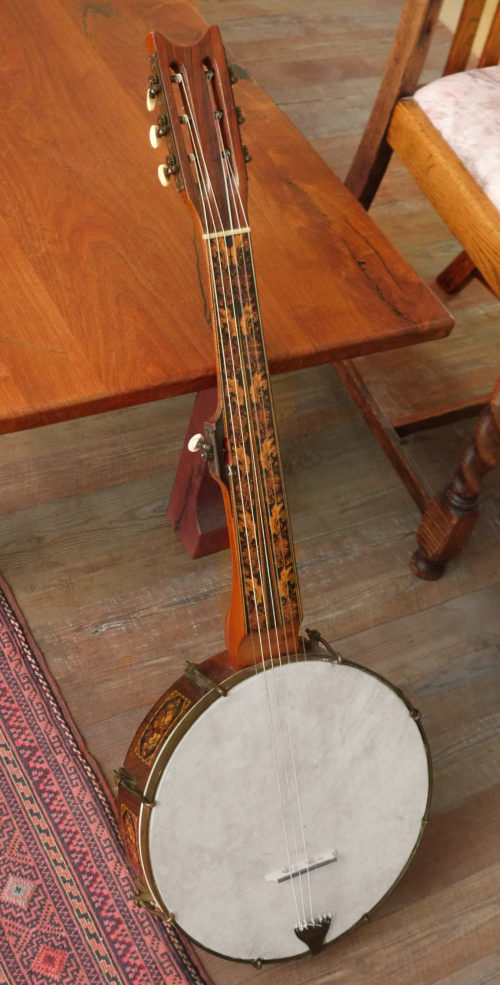 A rare and amazingly original English, Tunbridge ware fretless 7 string banjo. Circa 1850-60. This instrument is 100% original, and even the tailpiece is the original brass tailpiece. This banjo is also rare in that it has original geared tuning machines, not pegs like other examples from the period. The Tunbridge ware banjo is almost impossible to find in this condition and stage of originality. And Tunbridge’s are rare, period. The history? After Joel Sweeney – born to a farming family in Appomattox, Virginia and claimed to have learned to play the banjo from local African population, and the earliest known person to have played the banjo on stage – embarked on a European tour that included stops in London and Edinburgh. He played there for several months, and raised awareness of the instrument in England. As in the U.S., banjos began to be made by local craftsmen – they were still hand made and came in all shapes and sizes, with 5, 6, 7 and even 12 strings, and with one or more drone strings, sometimes on both sides of the neck. Only a few, best ones, such as this instrument, had an amazing amount of work put into them, none more so than those made by a very few firms centered around Tunbridge Wells in Kent, where the local craftsmen specialized in producing a particular form of Treen ware, made from up to 180 different colored woods. Holly, cherry, plum, yew, sycamore, and even imported lignum vitae were all used. The technique was to bind short lengths together and glue them into bundles so when viewed end on, a pattern or picture could be seen. Instrument length: 34 inches. With a 12 inch pot. Eight tensioners and shoes, all original. Original, rare circa 1850 German brass machine tuners (one bent shaft– but still operates perfectly). Original brass tailpiece. Fingerboard, and pot, consisting of inlaid woods as geometric patterns. All the inlays are intact. $2450. In a modern case.
A rare and amazingly original English, Tunbridge ware fretless 7 string banjo. Circa 1850-60. This instrument is 100% original, and even the tailpiece is the original brass tailpiece. This banjo is also rare in that it has original geared tuning machines, not pegs like other examples from the period. The Tunbridge ware banjo is almost impossible to find in this condition and stage of originality. And Tunbridge’s are rare, period. The history? After Joel Sweeney – born to a farming family in Appomattox, Virginia and claimed to have learned to play the banjo from local African population, and the earliest known person to have played the banjo on stage – embarked on a European tour that included stops in London and Edinburgh. He played there for several months, and raised awareness of the instrument in England. As in the U.S., banjos began to be made by local craftsmen – they were still hand made and came in all shapes and sizes, with 5, 6, 7 and even 12 strings, and with one or more drone strings, sometimes on both sides of the neck. Only a few, best ones, such as this instrument, had an amazing amount of work put into them, none more so than those made by a very few firms centered around Tunbridge Wells in Kent, where the local craftsmen specialized in producing a particular form of Treen ware, made from up to 180 different colored woods. Holly, cherry, plum, yew, sycamore, and even imported lignum vitae were all used. The technique was to bind short lengths together and glue them into bundles so when viewed end on, a pattern or picture could be seen. Instrument length: 34 inches. With a 12 inch pot. Eight tensioners and shoes, all original. Original, rare circa 1850 German brass machine tuners (one bent shaft– but still operates perfectly). Original brass tailpiece. Fingerboard, and pot, consisting of inlaid woods as geometric patterns. All the inlays are intact. $2450. In a modern case. -
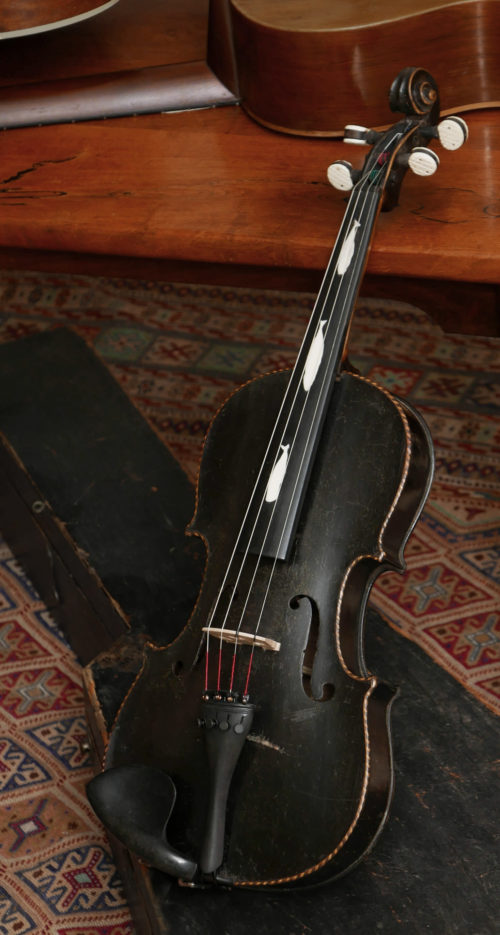 This full-size violin, is a wonderful example of New England whaler culture of the 19th century. The violin itself is probably German made, early 1800’s, with maple back and sides. But the whale inlays (bone) on the fingerboard were no doubt done locally in New England. And the custom, hand made wood case, original to the instrument, also features a brass whale on the top. (Note, the brass handle on the case, is the exact kind used by CF Martin on their coffin cases for guitars in the mid-19th century.) The bridge, and tailpiece are modern. Bone inlays on the tuning pegs also. The instrument is fully set up and ready to play. Price: $2150. In its original wood case, with a brass whale inlay on top.
This full-size violin, is a wonderful example of New England whaler culture of the 19th century. The violin itself is probably German made, early 1800’s, with maple back and sides. But the whale inlays (bone) on the fingerboard were no doubt done locally in New England. And the custom, hand made wood case, original to the instrument, also features a brass whale on the top. (Note, the brass handle on the case, is the exact kind used by CF Martin on their coffin cases for guitars in the mid-19th century.) The bridge, and tailpiece are modern. Bone inlays on the tuning pegs also. The instrument is fully set up and ready to play. Price: $2150. In its original wood case, with a brass whale inlay on top.